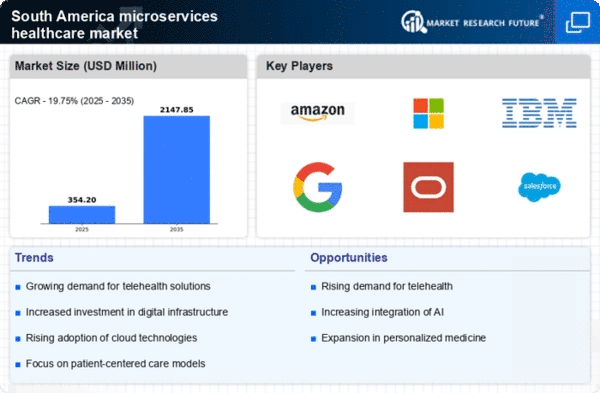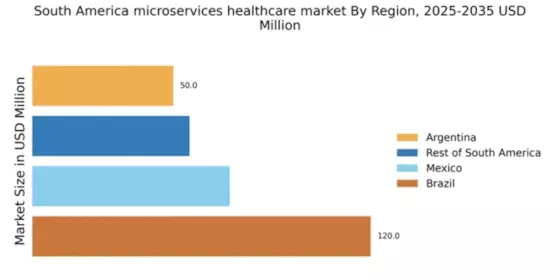Enhanced Regulatory Compliance
Regulatory compliance is a pivotal factor influencing the microservices healthcare market in South America. As governments implement stricter regulations regarding data privacy and security, healthcare organizations are compelled to adopt microservices architectures that facilitate compliance. Microservices enable organizations to implement robust security measures and ensure that patient data is handled in accordance with legal requirements. In recent assessments, it has been noted that compliance-related investments in the healthcare sector have increased by approximately 25% in South America. This focus on regulatory adherence not only mitigates risks but also enhances the credibility of the microservices healthcare market.
Growing Focus on Cost Efficiency
Cost efficiency remains a critical driver for the microservices healthcare market in South America. Healthcare organizations are increasingly adopting microservices to streamline operations and reduce overhead costs. By breaking down monolithic applications into smaller, manageable services, organizations can achieve greater flexibility and scalability. Reports indicate that organizations utilizing microservices architecture have experienced a reduction in operational costs by up to 30%. This financial incentive is compelling for many healthcare providers, as they strive to deliver high-quality care while managing budgets effectively. Consequently, the emphasis on cost efficiency is likely to propel the microservices healthcare market forward.
Integration of Advanced Technologies
The integration of advanced technologies such as artificial intelligence (AI) and machine learning (ML) is significantly influencing the microservices healthcare market in South America. These technologies enable healthcare providers to analyze vast amounts of data, leading to improved decision-making and patient outcomes. For instance, AI-driven analytics can identify patterns in patient data, facilitating early diagnosis and personalized treatment plans. As of November 2025, it is estimated that around 40% of healthcare organizations in South America are leveraging AI and ML within their microservices frameworks. This integration not only enhances service delivery but also positions the microservices healthcare market for future growth.
Increased Collaboration Among Stakeholders
Collaboration among various stakeholders in the healthcare ecosystem is becoming increasingly vital for the microservices healthcare market in South America. As healthcare providers, technology vendors, and regulatory bodies work together, the potential for innovation and improved service delivery expands. This collaborative approach fosters the sharing of best practices and resources, ultimately benefiting patients. Recent surveys indicate that about 70% of healthcare organizations in South America are engaging in partnerships to enhance their microservices capabilities. This trend suggests a collective effort to advance the microservices healthcare market, paving the way for more integrated and efficient healthcare solutions.
Rising Demand for Personalized Healthcare Solutions
The microservices healthcare market in South America is experiencing a notable shift towards personalized healthcare solutions. This trend is driven by an increasing awareness among patients regarding their health needs and preferences. As healthcare providers seek to enhance patient engagement, the adoption of microservices architecture allows for tailored services that cater to individual requirements. According to recent data, approximately 65% of healthcare organizations in South America are investing in technologies that support personalized care. This shift not only improves patient satisfaction but also optimizes resource allocation, thereby enhancing operational efficiency within the microservices healthcare market.

















